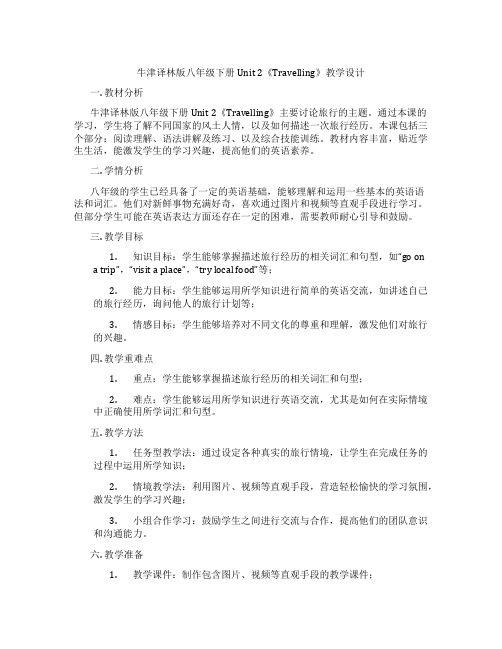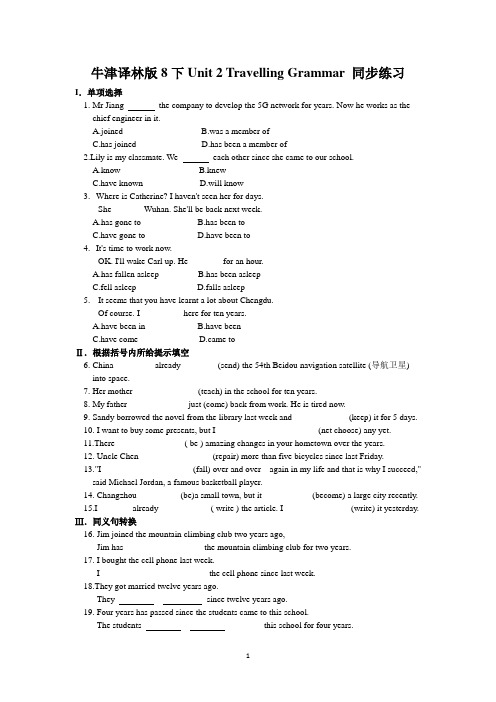江苏新教材牛津英语八年级下Unit 2 Travelling Grammar
Unit 2 Travelling Grammar-Task 八年级英语(牛津译林版)

Tip 1
It has been + 时间段 + since (一般过去时) = It is + 时间段 + since (一般过去时)
The doctors and the nurses have worked there since they arrived in Xiaogan.
HowWlohnegn?? SincWe we elelfetfstcshcohoolool non181t8ht,hJ, aJnaunaurayr,y2, 022002.0.
since + 从句(一般过去时)
eg. We have learnt a lot since the winter holiday_b_e_g__a_n_ (begin).
4. — The Smiths aren't at home. They have ____ Sanya for holiday.
— Oh, really? I have never ______ there before. A. been to; gone to B. gone to; been C. gone to; been to D. gone; been to
八年级下Unit 2 Travelling
Grammar-Task 课件
Lead in
他曾经去过世界上的许多地方。 He has ever been to many places in the world.
Where is Ronaldo?
He has gone to Kingdom of Saudi Arabia.
h_a_v_e_b_e_e_n__to 的句子中可以加 once, twice, ever, never等时间 状语; 而含 _h_a_v_e__g_o_n_e_t_o_ 的句子中不能加此类时间状语。 含 h_a_v_e__g_o_n_e_t_o_ 的句子中主语的人称一般为第三人称形式; 而含 h__a_v_e_b_e_e_n_t_o_ 的句子中对主语的人称没有限制。
牛津版八年级英语下册Unit2 Travelling-Grammar

4. While the girl _w__a_s__lo_o__k_i_n_g_ (look) for more souvenirs, her motherw__a_s__r_e_a_d_i_n_g_ (read) and her father _w_a__s_t_a_k__in_g_ (take) some photos.
We use ‘was’+‘ng’with the prons I , he , she and it .
We use ‘were’+‘doing’with the prons you , we and they .
Past continuous tense(过去进行时)
1.定义:表示过去某时正在进行的动作或存在的状态。 2.构成形式: 肯定式: 主+ were/was + 现在分词(V-ing) 否定式: 主+ weren’t/wasn’t +现在分词 疑问式: Were/Was+主+现在分词+…? 肯定回答: Yes, 主+ were/was. 否定回答: No, 主+ weren’t/wasn’t.
e.g. They were/He was having dinner at that time. (否) They weren’t/He wasn’t having dinner at that time. (疑) Were they/Was he having dinner at that time? (回答) Yes, they were/he was.
八年级英语下册 Unit 2 Travelling Grammar知识点拨 译林牛津版 教案

Unit 2 Travelling一、教学内容:Unit 2 TravellingGrammar二、教学目标:掌握Unit2的词法结构和用法:1. so…that /such…that/enough to/too…to…2. have/has been in, have/has been to, have/has gone to3. 延续性与短暂性动词经典讲解Grammar 1:so…that /such…that/enough to/too…to…解释:如此……以至于……so+ adj. /adv. +that从句或such+单/复数名词+that从句例:It’s so hot in summer that we can’t do without the air conditioner.夏天的天气热的我们少不了空调。
The teacher spoke so fast that I couldn’t understand what he was saying.老师讲得太快以致于我听不懂他在说什么。
He is such a genius that he doesn’t have to study much for exams.他是个天才,所以他考试都不用怎么念书。
They are such good basketball players that everybody wants to watch their games.他们个个都是很棒的篮球员,所以每个人都想去看他们打球。
表示:足以做某事enough to… 如: He is old enough to do it.意思是太……而不能too...to… 例: He is too young to go to school.中考so…that, too…to和enough to都是初中英语教材中的重要结构,在一定条件下它们可以相互转换,并经常成为中考考查的热点之一。
江苏新教材牛津英语八年级下Unit2 Travelling Reading 2

预习检测 见导学案
1.知识目标: 学习词汇:miss, fantastic, spend, ride, carton, such, magic, pie, feel, couple, indoor, roller coaster, character, parade, castle 学习词组:move at high speed, hurry to, on the way, such as, later in the afternoon, cannot stop doing sth, takes photos, a couple of, at the end of, enjoy oneself
学习句子: My parents and I have been in Hong Kong for two days. It was the best part of the day. I’m sure you’ll love them. I know you’ve gone to Hainan.
Have (has) gone to 表示已经去了某地(通常不在说话的地方) My mother has gone to London. 妈妈去了伦敦。(妈妈现在就在伦敦,不在家) Have (has) been to表示曾经到过某地(通常现在已经回来了) My mother has been to London twice. 妈妈去过两次伦敦。(妈妈现在已经回来了,在家) Have been in 一直呆在某地,后接地点 I came to Zhuhai in 2004. So I have been in Zhuhai for 2 years already. Have been 后接名词和表状态的词组 I have been a teacher since 2004. I have been at No. 4 Middle School for 2 years.
八年级英语牛津版下册课件:Unit2 travelling grammar(共41张PPT)

2. The video finished 4 minutes ago. The video has been over for 4 minutes/since 4 minutes ago.
arrive/co I arrived at your school an hour ago. I have been at your school for an hour/since an hour ago.
Xiao Xiao
Kimi
天哪~我的金鱼死 了!最后一面都没 见到~估计死了三 小时了~
这破手机 才买两 个月就这样了 不禁 摔~我要买个新的~
The gold fish has died. It has been dead since three hours ago. Kimi has bought the mobile phone. He has had it since two months ago.
join buy
I have been a member of/been in the school for 4 years/ since 4 years ago.
be in/ be a member of
have
I have had the house for 3 years.My grandpa has been be dead dead for 3 years. die
Unit 2 Grammar Verbs with for & since
Here are many tasks for you in today’s class. Only when I say “start”, you can stand up to answer questions freely. If your answer is right, you will get some points. If not, you won’t lose any point. The winner will get some prizes.
牛津译林版八年级下册Unit2《Travelling》说课稿

牛津译林版八年级下册Unit 2《Travelling》说课稿一. 教材分析《牛津译林版八年级下册Unit 2 Travelling》是一篇关于旅行的文章,通过描述不同人的旅行经历和目的,让学生了解和掌握与旅行相关的词汇和表达方式。
本篇文章题材贴近学生的生活,能够激发学生的学习兴趣,同时培养学生的阅读能力和语言运用能力。
二. 学情分析八年级的学生已经具备了一定的英语基础,能够理解和运用一些基本的英语知识。
但是,对于一些与旅行相关的词汇和表达方式,他们可能还比较陌生。
因此,在教学过程中,需要注重引导学生理解和运用这些新词汇和表达方式。
三. 说教学目标1.知识目标:学生能够掌握本课的生词和短语,理解文章的主旨大意,能够运用所学知识进行简单的英语交流。
2.能力目标:学生能够提高阅读理解能力,能够运用所学知识进行写作和口语表达。
3.情感目标:学生能够培养对旅行的兴趣,增强对不同文化的认识和理解。
四. 说教学重难点1.重点:学生能够掌握本课的生词和短语,理解文章的主旨大意。
2.难点:学生能够运用所学知识进行写作和口语表达,以及对文章中一些细节内容的理解。
五. 说教学方法与手段1.交际法:通过小组讨论、角色扮演等形式,让学生在实际语境中运用所学知识,提高口语表达能力。
2.任务型教学法:通过完成各种任务,让学生在实践中学习和发展语言能力。
3.情境教学法:通过创设各种情境,让学生在真实的语境中学习和运用语言。
六. 说教学过程1.导入:通过展示一些旅行图片,引导学生谈论自己的旅行经历,激发学生的学习兴趣。
2.阅读理解:学生独立阅读文章,回答相关问题,检查学生对文章内容的理解。
3.新课导入:讲解本课的生词和短语,让学生通过例句理解并运用这些词汇。
4.课堂活动:通过小组讨论、角色扮演等形式,让学生运用所学知识进行实际操作。
5.写作练习:让学生根据文章内容,写一篇关于自己旅行的作文。
6.总结:对学生的学习情况进行总结,对学生的表现进行评价。
牛津译林版八年级英语下册:Unit2TravellingGrammar

Questions about the dialogue
Millie: We (5)_h_a_v_e_g_o_n__e(go) to the Pattaya Beach. Look at this one. Isn’t it beautiful?
Daniel: Yes, the beach is very beautiful. I see Andy was there, too.
8B Unit 2 Travelling
Grammar
We use ‘have (has) been ’ to express the idea that someone went to some place and has already come back.
某人去过某地,现在已经回来了。
For example:
某人去了某地,现在仍然在那儿, 还没回来。
Millie and Amy have gone to the bookshop to buy some books on travelling. They will be back in an hour.
Exercise 1: Millie in Thailand
1.What places has Millie been to? She has been to the Grand Palace and the Pattaya Beach.
2.Which city has Andy gone? He has gone to Shanghai to visit his grandprents.
牛津译林版英语八下Unit2《Travelling》说课稿

牛津译林版英语八下Unit 2《Travelling》说课稿一. 教材分析牛津译林版英语八下Unit 2《Travelling》主要讲述了关于旅行的相关话题。
本单元通过介绍不同类型的旅行方式、旅行计划、旅行中的注意事项等,帮助学生掌握与旅行相关的词汇和表达方式,提高学生的听说读写能力。
教材内容丰富,贴近学生生活,有利于激发学生的学习兴趣。
二. 学情分析八年级的学生已经具备了一定的英语基础,对于日常生活中的基本表达已经能够熟练运用。
但是,对于一些关于旅行的专业词汇和表达方式可能较为陌生。
因此,在教学过程中,需要关注学生的个体差异,针对不同学生的学习需求进行引导和帮助。
三. 说教学目标1.知识目标:学生能够掌握与旅行相关的词汇和表达方式,如旅行方式、旅行计划、旅行注意事项等。
2.能力目标:学生能够听懂、会说、会读、会写关于旅行的句子,提高学生的听说读写能力。
3.情感目标:通过本单元的学习,学生能够培养对旅行的兴趣,提高对英语学习的热情。
四. 说教学重难点1.重点:学生能够掌握与旅行相关的词汇和表达方式。
2.难点:学生能够运用所学的词汇和表达方式进行实际交流,编写关于旅行的短文。
五. 说教学方法与手段1.交际法:通过模拟真实场景,让学生在实际交流中运用所学知识。
2.任务型教学法:通过完成各种任务,激发学生的学习兴趣,提高学生的参与度。
3.多媒体辅助教学:利用多媒体课件、图片、视频等丰富教学手段,提高学生的学习兴趣。
六. 说教学过程1.导入:以一段关于旅行的视频导入,激发学生的学习兴趣。
2.新课呈现:通过展示图片、实物等,引入本节课的主题,引导学生学习相关词汇和表达方式。
3.课堂练习:设计不同类型的练习,让学生在实际交流中运用所学知识。
4.小组活动:学生分组进行讨论,分享各自的旅行经历,促进学生之间的交流。
5.课堂小结:对本节课所学内容进行总结,帮助学生巩固记忆。
6.课后作业:布置相关任务,让学生课后进行练习,巩固所学知识。
【牛津版】八年级下册:Unit 2 Travelling Grammar课件

Differences
have/has been to … have/has gone to …
Differences
have/has been to … past went there present be back future
past
have/has gone to … present
future
past two days ago
for
three days
since
two days ago
Differences
for for three days a month since since two days ago February
for
+
a period of time
since
+
a time point in the past
She has gone to Hong Kong.
Where is Deng Chao?
He is not in Hong Kong.
He has gone to Hangzhou.
Where is Wang Baoqiang?
He is not in Hangzhou.
He has gone to hospital.
Use since or for to fill in the blanks: for _______ two years since _______ two years ago
since 2013 _______
since _______ yesterday since _______ she left here
went there
江苏新教材牛津英语八年级下Unit 2 Travelling Unit 2 Travelling 教案

2.Recite the reading
教学反思
课题
Unit 2Travelling---Reading 2
课时
第三课时
执教时间
复备人
教学目标
1.知识目标:
学习词汇:miss, fantastic, spend, ride, carton, such, magic, pie, feel, couple, indoor, roller coaster, character, parade, castle
任务六:看一看写一写,完成第21页Part A部分练习并与你的同桌核对答案。
任务七:听第20页Eddie和Hobo的对话,回答下面问题。
1. Where is Eddie going?
2. Does Hobo want to go too?
3. What does Hobo want to bring?
I don’t think it’s a holiday for me.
2.技能目标:
1)了解外国著名城市胜地和受欢迎的景点。
2)通过对话谈论人们在不同景点从事的活动。
3.情感目标:初步认识到这些旅游胜地是全人类的共同财富。
教学重点
外国城市著名的旅游胜地和受欢迎的景点
教学难点
通过对话谈论人们在不同景点从事的各种活动
4. Why is Eddie unhappy?
任务八:Watch and actout the dialogue.
Step4:总结提升
Translation:
1.北京是中国的首都。
2.他们在塔桥上干什么?他们可以在那儿看到漂亮的景色和拍照。
牛津译林版八年级下册Unit 2《Travelling》教学设计

牛津译林版八年级下册Unit 2《Travelling》教学设计一. 教材分析牛津译林版八年级下册Unit 2《Travelling》主要讨论旅行的主题。
通过本课的学习,学生将了解不同国家的风土人情,以及如何描述一次旅行经历。
本课包括三个部分:阅读理解、语法讲解及练习、以及综合技能训练。
教材内容丰富,贴近学生生活,能激发学生的学习兴趣,提高他们的英语素养。
二. 学情分析八年级的学生已经具备了一定的英语基础,能够理解和运用一些基本的英语语法和词汇。
他们对新鲜事物充满好奇,喜欢通过图片和视频等直观手段进行学习。
但部分学生可能在英语表达方面还存在一定的困难,需要教师耐心引导和鼓励。
三. 教学目标1.知识目标:学生能够掌握描述旅行经历的相关词汇和句型,如“go ona trip”,“visit a place”,“try local food”等;2.能力目标:学生能够运用所学知识进行简单的英语交流,如讲述自己的旅行经历,询问他人的旅行计划等;3.情感目标:学生能够培养对不同文化的尊重和理解,激发他们对旅行的兴趣。
四. 教学重难点1.重点:学生能够掌握描述旅行经历的相关词汇和句型;2.难点:学生能够运用所学知识进行英语交流,尤其是如何在实际情境中正确使用所学词汇和句型。
五. 教学方法1.任务型教学法:通过设定各种真实的旅行情境,让学生在完成任务的过程中运用所学知识;2.情境教学法:利用图片、视频等直观手段,营造轻松愉快的学习氛围,激发学生的学习兴趣;3.小组合作学习:鼓励学生之间进行交流与合作,提高他们的团队意识和沟通能力。
六. 教学准备1.教学课件:制作包含图片、视频等直观手段的教学课件;2.练习题:准备相关的练习题,以便在课堂上进行操练和巩固;3.教学素材:收集一些关于旅行经历的英语文章和视频,用于拓展学生的视野。
七. 教学过程1.导入(5分钟)利用一张美丽的旅行图片或视频,引导学生谈论关于旅行的主题。
8下_Unit2_Travelling_Grammar_B

4. 他离开家已经10年了。
He has been away from home for ten years.
5. 她已经到达公司半个小时了。
She has been in the company for half an hour.
Homework
• • • 复习for和since的用法。 复习延续性动词和非延续性动词的用法。 预习Integrated skills。
I came to this school two years ago.
Exercises:
做 《课课练》P17-18 三、四
瞬间性动词 catch a cold get up put on become interested in open/close wake up
延续性动词 have (has) had a cold have (has) been up have (has) worn have (has) been interested in have (has) been open / have (has) been closed have (has) been awake
True or False?
(1) I have seen many interesting films since 2012. √ ( )
(2) Tom’s dog has died for two years. ( × ) has been dead (3) They have been in Guilin for a week. (√ )
get married
短暂动词
begin/start finish/stop
come/go/arrive
延续性动词
2020-2021学年牛津译林版八年级下册Unit 2 Travelling Grammar

牛津译林版8下Unit 2 Travelling Grammar 同步练习I.单项选择1. Mr Jiang the company to develop the 5G network for years. Now he works as thechief engineer in it.A.joinedB.was a member ofC.has joinedD.has been a member of2.Lily is my classmate. We each other since she came to our school.A.knowB.knewC.have knownD.will know3.--Where is Catherine? I haven't seen her for days.--She_______ Wuhan. She'll be back next week.A.has gone toB.has been toC.have gone toD.have been to4.--It's time to work now.--OK. I'll wake Carl up. He _______ for an hour.A.has fallen asleepB.has been asleepC.fell asleepD.falls asleep5. --It seems that you have learnt a lot about Chengdu.--Of course. I _________ here for ten years.A.have been inB.have beenC.have comeD.came toⅡ.根据括号内所给提示填空6. China_________ already________ (send) the 54th Beidou navigation satellite (导航卫星)into space.7. Her mother_______________(teach) in the school for ten years.8. My father _____________ just (come) back from work. He is tired now.9. Sandy borrowed the novel from the library last week and ____________ (keep) it for 5 days.10. I want to buy some presents, but I_______________________ (net choose) any yet.11.There _______________ ( be ) amazing changes in your hometown over the years.12. Uncle Chen ________________ (repair) more than five bicycles since last Friday.13."I ____________________ (fall) over and over again in my life and that is why I succeed,"said Michael Jordan, a famous basketball player.14. Changzhou__________(be)a small town, but it___________ (become) a large city recently.15.I _______ already ___________ ( write ) the article. I_______________ (write) it yesterday. Ⅲ.同义句转换16. Jim joined the mountain climbing club two years ago,Jim has _________ ________ the mountain climbing club for two years.17. I bought the cell phone last week.I _____________ ___________the cell phone since last week.18.They got married twelve years ago.They since twelve years ago.19. Four years has passed since the students came to this school.The students ________this school for four years.20.The girl began to learn English five years ago.The girl __________ __________ English ____________ five years.21.We have lived here for six years.We here_______ ___________ _________ ___________.22.She went to Beijing and hasn't returned yet.She has ____________ Beijing.23.The old man left his hometown fifty years ago.The old man ________ his hometown for fifty years.24.1 borrowed this book two weeks ago.I ___________ this book ______________ two weeks ago.25.The children arrived here at 9 o'clock.'The children __________ here since 9 o'clock.Ⅳ.阅读下面短文,在空白处填入适当的内容或括号内单词的正确形式Venice is considered to be one of the most 26 (beauty) cities in the world. It has been known as the "City of Canals (运河) ", "City of Bridges", and "City of Water". The city is made up of about 100 27 (island), 150 canals, and 400 bridges. There 28 (be) no roads in the city, so there are no cars. The only forms of transportation (交通) are by water and 29 foot. There are roads, a train station, 30 an airport at the edge (边缘) of the city. One of the famous symbols of Venice is a "gondola (平底船),,. Gondolas are still used today, though 31 (main) by tourists. All Venetian gondolas are painted black--it was a law that was passed in the 32 (sixteen) century. Most Venetians travel by water buses called "Vaporetti" Venice has one of the world's most famous bridges 33 (call) the Rialto Bridge, built in 1591.Venezuela, a country in South 34 (American),means "little Venice". This is because the early European visitors to Venezuela first met the local people who lived in homes built over the water, reminding 35 (they) of Venice.26. 27. 28. 29. 30._________31. 32. 33. 34. 35._________Ⅴ. 语法入门A用方框中所给词组的适当形式填空。
2021秋八年级英语下册Unit2TravellingGrammar课件新版牛津版

I (3)__b_o_rr_o_w__e_d__(borrow) a book about Hong Kong a week ago. It’s very useful. I (4) _h_a_v_e__k_e_p_t_ (keep) it with me for a few days. It helps me learn more about Hong Kong.
2、三者的常见用法 have (has) been (to) + 地点+次数 have (has) been (in) + 地点 + 段时
间/句子 have (has) gone (to) + 地点
3、共同点 当后跟地点是副词时,介词省略。
have been to / in 和 have gone to的区别
Daniel: The beach is beautiful. I see Andy playing on the sand too.
Millie: Yes. We went there with his family. Daniel: I see. By the way, shall we invite
2. We have been tion the USA for many years.
3. —How many times have you been itno Hong-shan Zoo ? —Twice.
- 1、下载文档前请自行甄别文档内容的完整性,平台不提供额外的编辑、内容补充、找答案等附加服务。
- 2、"仅部分预览"的文档,不可在线预览部分如存在完整性等问题,可反馈申请退款(可完整预览的文档不适用该条件!)。
- 3、如文档侵犯您的权益,请联系客服反馈,我们会尽快为您处理(人工客服工作时间:9:00-18:30)。
Daniel and Millie are chatting at a weekend. Complete their conversation with the correct forms of the verbs in bracket.
D: I see. By the way, shall we invite Andy to go for a picnic tomorrow? M: Andy isn’t here this weekend. He and have gone (go) to the his parents (7) _________ countryside. They will be back tomorrow afternoon.
Have been to/in have gone to 1.A: Where’s Jim, Li Lei? has gone to B: He ______________his school library. have been in 2.The Greens _____________China for three years. have been to 3.We _____________the Great Wall twice. It’s very beautiful. Have 4. _______you ever __________ been to Shanghai? gone to the 5. Lily isn’t in the classroom. She has __________ lab. been in 6.________Lucy __________ China since 5 years Has ago.
Translation: 1.A: 我昨天没看见你.你去哪儿了?B:我去电影院了. A:你什么时候去电影院的?B:昨天下午. A: I didn’t see you yesterday. Where have you been? B: I have been to the cinema. A: When did you go to the cinema? B: Yesterday afternoon. 2.A:Tony曾经去过法国吗?B:是的. A:他去过埃菲尔铁塔吗?B:没有.
句型转换 1. He has already finished his homework. ____ he _____ his homework _____? He _____ _____his homework ____. 2. I have never been to the Great Wall. ____ you ____ been to the Great Wall? .肯定和否定回答
Daniel and Millie are chatting at a weekend. Complete their conversation with the correct forms of the verbs in bracket.
Daniel: I haven’t seen Mr Wu for days. Where (1) ______ he ______ has gone (go) ?
Someone went to some place and is still there A B
2、三者的常见用法 been (to) + 地点+次数 been (in) + 地点 + 段时间/句子 gone (to) + 地点 3、共同点 当后跟地点是副词时,介词 省略。
Fill in blanks
Millie: He (2) __________ (go) to Tianjin has gone to attend a meeting.
been (be) anywhere Have you _____ D: (3) _____ recently? have been (be) to Hainan M: Yes, I (4) __________ with my parents.
2. Sandy has never been to South Hill. She wants to go with them.
We use ‘have (has) gone’ to express the idea that someone went to a place but has not yet returned. 1. Kitty and her family have gone to Hong Kong. They will come back next week. 2. Suzy is not at home at the moment. She has gone to the bookshop.
A: Has Tony ever been to France? B: Yes, he has.
A: Has he ever been to the Eiffel Tower? B: No, he hasn’t.
3.A:你爸爸在哪儿? B:他去美国了.他下周回来. A: Where is your father? B: He has gone to the USA. He will be back next week. 4.A:他们去印度了吗? B:不,没有.他们明天离开. A: Have they gone to India? B: No, they haven’t. They will leave tomorrow. 5. A:我几天没看见你了? 你去哪儿了? B:我去苏格 兰(Scotland)参观城堡了. A: I haven’t seen you for days. Where have you been? B: I have been to Scotland to visit castles .
判断下列句子的正误
( T ) 1. I have been to the library to borrow the famous book, it’s on my bookshelf now.
( F ) 2. Daisy has been to the supermarket and I don’t know when she will be back.
B Verbs with for and since
Questions about reading:
1. How long hasn’t Kitty seen Millie? Kitty hasn’t seen Millie since last month. 2. How long has Kitty been in Hong Kong?
Daniel and Millie are chatting at a weekend. Complete their conversation with the correct forms of the verbs in bracket.
have you D: Oh, that’s great! (5)______ been (be) to Sanya? _______
A Using have/has been and have/has gone
Where has Kitty been? Has she ever been to Hong Kong Disneyland?
Has she ever been to...?
Have you ever been to ...? Yes, I have. / No, I haven’t.
1. 知道have/has been(to),gone(to), been (in)三者之间的根本区别: have/has been to 表示当事人曾经去过 某地。 have/has been in 强调当事人在某地 待过一段时间。 have/has gone to 说话时当事人不在 现场,去了某地。
have been to 曾经去过某地(已返回)
Someone went to some place and has already come back
A
B
have been in 去某地一段时间
someone stay in some place for some time
A
B ay
have gone to 去了某地 (没有回来)
been (be) to the M: Sure, we (6) have __________ beach there. Look at these photos.
D: The beach is beautiful. I see Andy playing on the sand too. M: Yes. We went there with his family.
We use ‘have (has) been ’ to express the idea that someone went to some place and has already come back.
1. Millie and Amy have been to South Hill. They want to go there again.
2. 技能目标: 1) 区别运用have/has been 和have/has gone. 2) 学习现在完成时延续性的动作或状态 的表示方法。 3) 理解非延续性动词和延续性动词的不 同用法,以及他们之间的转换。 3. 情感目标:学会使用恰当规范的语言。 在与他人对话中学会准确表达自己的思想。
预习检测 见导学案
1.知识目标: 学习词汇:sand, countryside, over, marry, dead 学习词组:on the first day of, Ocean Park, dolphin show
